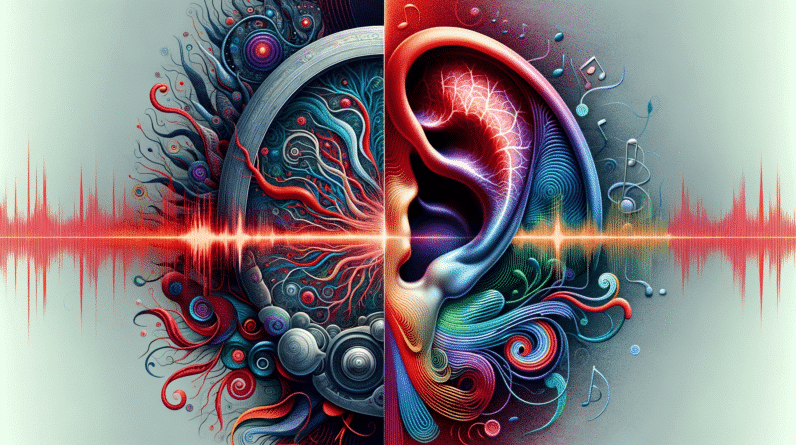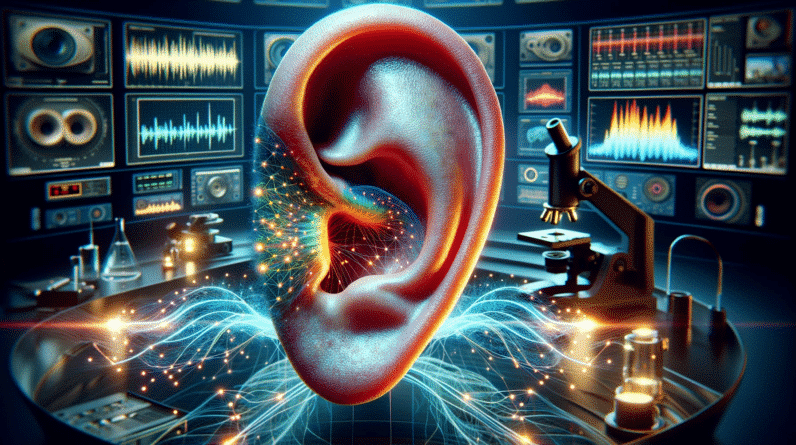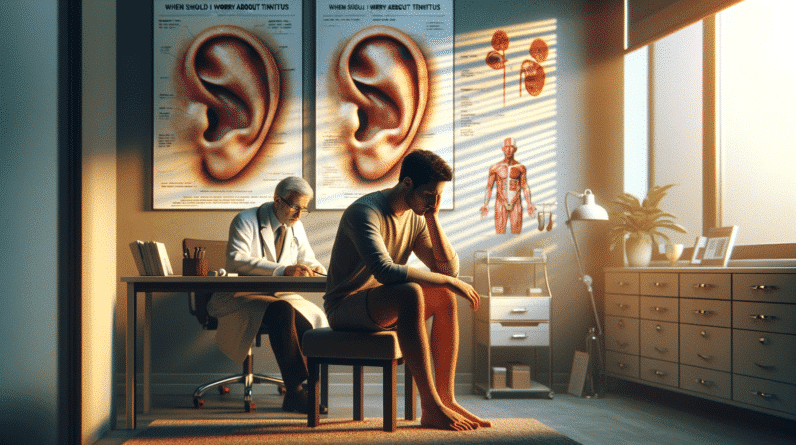
We may earn money or products from the companies mentioned in this post.
As an Amazon Associate I earn from qualifying purchases.
Introduction
Dealing with conditions that are difficult to understand such as Vestibular Migraine and Tinnitus, can make the situation all the more challenging to deal with. These conditions affect our senses and can disrupt our daily life. In exploring these two conditions, hopefully, we can shed some light and provide a better understanding of the symptoms, causes, and treatments.
What is Vestibular Migraine?
It’s a type of neurological disorder where patients experience vertigo, among other symptoms, with or without headache. The dizzy spells that individuals go through result from our body’s impairment to perceive its position and motion, a function contributed by the vestibular system. When the system fails in doing its part, the odds increase for vestibular disorders, including vestibular migraine.
Defining Tinnitus
Tinnitus, on the other hand, is described often as a constant ringing in the ears, and can also sound like hissing, buzzing, whooshing, humming, whistling, or ticking. It’s not a standalone disease, but rather a symptom signaling an underlying condition. Could it be a symptom of vestibular migraine? Let’s examine it further.
Examining the Connection between Vestibular Migraine and Tinnitus
Though the connection between vestibular migraine and tinnitus isn’t straightforward, current studies are inching toward a positive link.
How Tinnitus and Vestibular Migraines Interact
Research suggests that individuals with Vestibular Migraines often report having Tinnitus. As a common symptom shared by ear disorders, Tinnitus aligns with the theory that vestibular migraines might arise from the inner ear. Many patients report a worsening of their Tinnitus symptoms during their Vestibular Migraine episodes.
Underlying Causes of Vestibular Migraine and Tinnitus
In many cases, Tinnitus could be the fallout result of an ear infection. Our ears, specifically the inner ear, play an essential role in perceiving sound and maintaining balance. When the inner ear gets infected, our ability to hear and balance can be affected. Any damage or changes in the auditory system, including an ear infection, can potentially trigger Tinnitus. In the case of vestibular migraines, scientists believe they might be triggered by a range of factors, including stress, certain foods and drinks, lack of sleep, or weather changes.
When we see the overlap in symptoms, it’s no surprise that scientists are exploring the possible link between these two conditions. Their connection may provide answers and even break new ground in providing treatment options for those suffering from these conditions.
Symptoms and Effects
Let’s now focus on the noticeable changes these conditions reflect in our bodies. Understanding the symptoms is essential to recognizing when to seek professional help and what approach to take for effective treatment.
Warning Signs that Tinnitus is Going Away
Much like other conditions, there are signs that tinnitus is going away. The ringing or buzzing sound gradually becoming softer over time is the most common sign. Some people also experience intermittent periods of silence, which can get longer over time. Remember, these signs may vary per person, and it’s essential to consult with a healthcare professional to ascertain your condition accurately.
Symptoms for Vestibular Migraine and Tinnitus
The symptoms of tinnitus include hearing sounds that are not there like ringing, buzzing, humming, or even clicking. For vestibular migraines, the symptoms are more varied, things like unsteadiness, dizziness, vertigo, and problems with coordination.
Keep in mind these symptoms often overlap with other conditions, which underlines the importance of professional diagnosis.
Diagnosis and Treatments
Now that we know about the symptoms, the next step is diagnosis. Correctly identifying what you have can provide direction to the right treatment.
How to Know if You Have Tinnitus
How do you know if you have tinnitus? Auditory symptoms such as hearing sounds that aren’t their common signs. However, some cases involve more than just auditory signs; they can be coupled with sleep problems, irritability, and anxiety. A comprehensive hearing examination, medical history discussion, and a physical check-up are essential steps for a professional diagnosis.
Available Treatments for Tinnitus and Vestibular Migraine
Once the diagnosis is confirmed, your healthcare provider will then discuss what treatments are available. In some cases, a change in lifestyle and behavior modification can alleviate symptoms. Specific treatments for tinnitus may include sound therapy, Lipo-Flavonoid, and cognitive-behavioral therapy. For vestibular migraines, a change in diet and regular exercise can be quite beneficial.
Managing and treating tinnitus and vestibular migraines might be challenging, but with professional guidance, a patient can navigate this path more comfortably.
Conclusion
In wrapping things up, managing Tinnitus and Vestibular migraines may involve a combination of comprehensive diagnosis, effective treatment, and changes in lifestyle. It’s about understanding your body well, recognizing the signs when they show up, and seeking help when needed. As much as these conditions can be disconcerting, remember that you’re not alone. The journey to relief and better health might be challenging, but with the right tools and support, it’s achievable.
Keep learning and exploring on our website, because understanding these conditions is the first step towards managing them. After all, our health and well-being are worth it. Take a step forward today!
Vestibular Migraine And Tinnitus - Frequently Asked Questions (FAQ)
Vestibular Migraine is a type of migraine that impacts the vestibular system, affecting balance and causing dizziness and vertigo. A person suffering from this may experience symptoms, even without a headache. For more details, check our detailed article on [Vestibular Migraine](https://pulsatiletinnitustreatments.com/migraines-and-tinnitus).
While the link isn’t definitive, studies suggest a positive connection. Many individuals with Vestibular Migraine have reported Tinnitus. During a Vestibular Migraine episode, Tinnitus symptoms may get worse. Read more about their connection at [Understanding Tinnitus and Vestibular Migraine](https://pulsatiletinnitustreatments.com/tinnitus-and-vestibular-migraine).
Treatments may include lifestyle and behavioral changes, sound therapy, and cognitive-behavioral therapy for Tinnitus, or adjustments in diet and regular exercise for Vestibular Migraine. However, it is essential to consult with a healthcare professional for an accurate diagnosis and treatment plan. Read more on our detailed page about [Treatments for Tinnitus and Vestibular Migraine](https://pulsatiletinnitustreatments.com/lipo-flavonoid-tinnitus).
Yes, lifestyle changes can significantly help manage these conditions. For Tinnitus, reducing exposure to loud noises, limiting caffeine and alcohol can help. For Vestibular Migraines, avoiding triggers and managing stress can be quite beneficial. Read our [guide on managing Tinnitus and Vestibular Migraine](https://pulsatiletinnitustreatments.com/Understanding-Tinnitus).
While it may not be the case for every patient, several with Vestibular Migraine have reported Tinnitus. This shared symptom suggests a potential correlation between these conditions, although further studies are needed to establish more reliable conclusions. Learn more at [Tinnitus and Vestibular Migraine](https://pulsatiletinnitustreatments.com/tinnitus-and-vestibular-migraine).
Amazon and the Amazon logo are trademarks of Amazon.com, Inc, or its affiliates.
Related posts:
- Understanding ADHD and Tinnitus: Is there a Connection?
- Beyond the Ringing: The Unexpected Connection Between OCD and Tinnitus
- Antibiotics and Tinnitus: The Hidden Link and How to Protect Your Hearing
- Unraveling the GERD-Tinnitus Connection: Comprehensive Guide to Understanding and Treating Acid Reflux and Tinnitus Together





